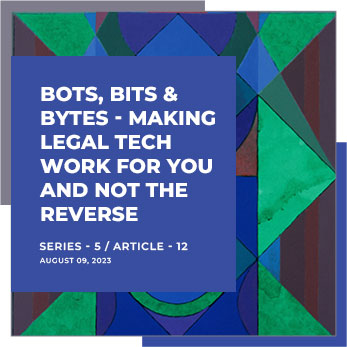“Importantly, conducting background checks appropriately and following all applicable laws, rules, and guidelines is important for all employers. It doesn’t matter if you have 5 or 500,000 employees. The rules — and the risks — are relevant to you!”
How would you feel about being considered as a candidate for a job in a law firm before you ever even applied? Worse still, how would you feel about being rejected for that job before you even got to the interview?
Today, law firms are checking out candidates on social media before the candidate has even approached the firm. In fact, 91% of firms will research you online as part of their vetting process. What happens when a candidate ‘fails’ a background check? Various circumstances dictate whether the adverse ‘hits’ can be resolved or whether they will doom the candidacy. We will examine background check policies and their ramifications.
Recruitment Via Social Media
A survey conducted by The Society for Human Resource Management disclosed that 77% of respondent companies use social networking sites to recruit candidates, and even upon receiving a referral for a candidate from a current employee, 91% of firms will still conduct an online background check. In an effort to reach as many potential candidates as possible, firms now regard the harnessing of social media as an essential part of their recruitment strategy and use it as a mainstream tool and not just as a cutting-edge add-on, as it was viewed just a few years ago. The reason why social media plays such an important role in recruitment? The answer is that millennials now make up 90% of the workforce and 88% of that demographic use social media. It is, therefore, the foremost tool for casting the net of recruitment and then conducting background checks.
Which Platforms to Check?
Experts note that LinkedIn is not the right place for searching out law students because those with little work experience will not yet have built up a work history to display there. Rather, the social media sites of choice for the target demographic are platforms like Twitter, Snapchat, and Instagram, and it is there that employers can both publicize job openings as well as conduct their online background checks. And after learning more about a candidate—perhaps after an initial interview—the employer can then refer to social media for verification of a candidate’s representations.
Critics of such widespread use of social media to vet job candidates claim that the practice can have an adverse impact on economically disadvantaged persons who may not have a significant social media presence. Therefore, employers should not rely so much on social media for recruitment, rather only use it to supplement more traditional recruitment methods. That argument is countered, however, by those who say that today job candidates across all ethnic and economic sectors are fully immersed in social media and that to claim otherwise is in itself a racist or discriminatory viewpoint.
What Gets Checked
Law firms typically look at an applicant’s employment history, education, criminal record, and credit history, as well as social media content. Any of those categories might raise a red flag leading to the candidate being disqualified from consideration. Among concerns that might arise regarding employment history are time gaps between jobs, short-term periods of employment, and discrepancies between the salary represented and the compensation that typically goes with the position. Credit check information may only be relevant to concerns about a new hire handling client finances, and similarly, a negative criminal conviction report might merely reveal some rather commonplace occurrences or disclose matters that are of real significance.
Impact of a ‘Failed’ Background Check
Given the rather pejorative context of the term ‘failed’, most background check services shy away from using that terminology when discovering adverse ‘hits’ in the course of conducting a background check, and your own organization should probably follow that lead. What a ‘hit’ means is that the screening returned unexpected results, which may either result in halting the process of going further with the candidate’s application or requiring a deeper examination. This is where a written policy on background checks is important because not only does it provide guidance to HR and others involved in hiring the lawyer, but it also lends uniformity and consistency, which can be referenced in the event a rejected candidate seeks to challenge a declination legally.
Developing a Background Check Policy
Not all adverse reports necessarily automatically disqualify the candidate from the position, and, depending upon the severity of the adverse reporting event, or its relevance to the position being recruited for, it might be advisable to give the candidate an opportunity to explain the adverse reporting and address the employer’s concerns. Among the steps to be included in developing a sound background check policy and procedure are the following:
- A compliant disclosure to the candidate as to how your background check procedure works, along with a clear, concise authorization and release form to be signed by the candidate;
- A stated hierarchy as to who the decision-makers will be in deciding upon the hiring of a candidate and who has veto power over a hiring decision;
- A policy as to adverse report notification to the candidate, the time for the candidate to have an opportunity to respond, and under what circumstances an offer can be retracted;
- Compliance with the Fair Credit Reporting Act (FCRA) requirements and compliance with state requirements.
It should be noted, however, that a candidate who refuses to grant authorization for a background check to be performed, or for past employers to be contacted, or who dismisses background check issues without responding, or who has blatantly falsified representations on his or her resume or application, are probably candidates the firm would be wise not to continue with.
The bottom line for any background check policy considerations is that they should provide the firm with accurate data for making an informed decision one way or another regarding the prospective hire.
Executive Summary
The Issue
How to develop a sound background check policy for your firm?
The Gravamen
A written policy that applies equally to all candidates and which can be clearly disclosed to the candidate upfront is the most prudent step to take regarding the rather touchy issue of background checks.
The Path Forward
Remember that not all adverse reporting necessarily spells doom for the hiring of an otherwise qualified candidate.
Action Items
Know Your Compliance Requirements:
Besides FCRA, various other privacy laws might apply to your firm’s conduct of a background check, and it is important to know what such compliance entails.
Use of Social Media:
Virtually no recruitment campaign can be effective today without reaching out via social media, and therefore, this first step in the process must speak to the candidate market you wish to address.
When to Request A Response:
Oftentimes, an adverse reporting event may have a credible explanation, which, if the candidate is given the opportunity to respond, may clear up an otherwise problematic ‘hit’.
A Hiring Hierarchy:
It is advisable that your hiring process be multi-layered (but without becoming bureaucratic) so as to give the various hiring stakeholders a say as to whether to proceed with a candidate.
Further Readings
- https://www.linkedin.com/pulse/how-hiring-decision-makers-vet-you-online-before-after-paul-sims
- https://www.legalmatch.com/law-library/article/employee-background-check-lawyers.html
- https://www.techtarget.com/searchhrsoftware/feature/Employee-background-check-errors-harm-thousands-of-workers
- https://www.betterteam.com/disqualify-background-check
- https://www.shrm.org/hr-today/news/hr-magazine/pages/0914-social-media-hiring.aspx







